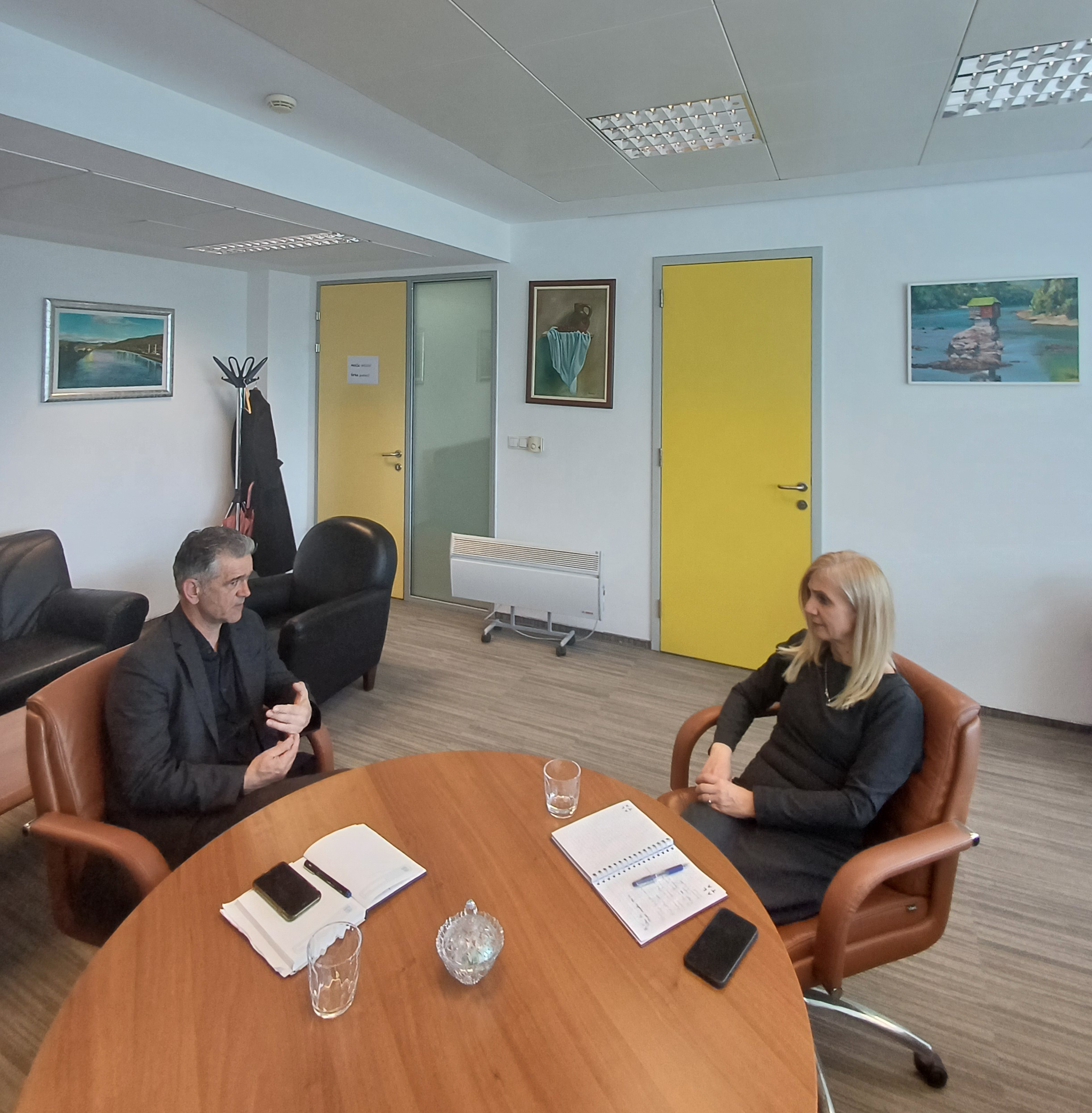As part of cooperation with journalists within the project “Citizens in the Fight against Silent Corruption”, we bring you a collaboration with the portal Fokus.ba and a text on the subject of sexual blackmail, with the title “Sexual Blackmail in BiH: “You Need a Man to Show What Power Is”.
************
– After the first week of work, a colleague goes on a business trip with the director. Then she disappears, change the number, email, everything. The director tells us that she actually does not want to work, that she went abroad. Then he questions us individually about our private lives. Who we live with, do we have a boyfriend, how much we love them.
To each of our answers he would say “you young people, you need a man to show you what power is”.
The day after that, he informs me that we are going to Neum for a business forum. On the way to Neum, he first starts with the question “Are you a virgin?”, I do not answer in shock. Then he says “you must be good”, “do you like to cuddle”.
I do not answer any questions. A colleague who has disappeared goes through my mind. I feel terrified, helpless, my heart skips a beat with fear. I am thinking how to escape when I get there and get back. When we arrived in Neum, when getting out of the car, he took my bag from my hand and said “I will bring the things in”.
He grabbed my neck and forced his lips to mine. I struggle for him to let me go. He says “Hey, what are you thinking” – this is one of many similar testimonies shared on the Facebook group “I did not ask” which was founded by four female colleagues and former students of the Academy of Performing Arts in Sarajevo.
There are countless such confessions. For two and a half years, thousands of women from BiH and the region have shared their experiences of sexual harassment, sexual abuse and sexual extortion in the group.
********
How to recognize sexual extortion?
“Sexual extortion is if one person who is in a position of power over another person takes advantage of that position of power and blackmails of a sexual nature, all in order to achieve a certain profit”, explains Vedrana Frašto, feminist activist and manager of the office and programs of the CURE Foundation.
Recently, the focus of certain organizations has been on raising awareness of sexual extortion or sextortion.
Helsinki Citizens’ Assembly Banja Luka with partner organizations in numerous BH cities organized street actions with aim to draw attention to sexual blackmail, which is a combination of sexual harassment and abuse of power (corruption), in order to obtain sexual benefits.
Having this in mind, the Helsinki Citizens’ Assembly Banja Luka published a study on the topic “Prevalence of Sexual Extortion (sextortion) in Society”. It is encouraging that the research showed that the largest number of respondents, over 90%, are familiar with the concept of sexual extortion, while only up to 5% of respondents are not familiar with this phenomenon.
******
Sexual blackmail does not exist in criminal laws in BiH
Criminal laws in Bosnia and Herzegovina, namely, do not recognize sexual blackmail as a specific phenomenon. However, they recognize the concepts of rape by abuse of position (Criminal Code of FBiH) and sexual intercourse by abuse of position and coercion into sexual intercourse (Criminal Code of RS).
However, the Agency for Gender Equality of BiH told Fokus.ba that, although the concept of sexual extortion does not exist in the Law on Gender Equality in BiH, it can be said that the current laws in Bosnia and Herzegovina recognize and contain descriptions of criminal offenses that can be brought to connection with this term.
Namely, as explained by the Agency, the Criminal Code of the FBiH recognizes the concept of rape by abuse of position, for which a prison sentence of three months to three years is prescribed, while the Criminal Code of the RS recognizes sexual blackmail and rape by abuse of position with a prison sentence of one to eight years, that is two to five years.
*****
Several complaints to the Ombudsman
And the Institution of Human Rights Ombudsman of BiH told Fokus.ba that they received only a few complaints related to sexual harassment:
– It is not a significant number, and they related to sexual and/or sex harassment and, in connection with that, mobbing at the workplace.
The ombudsman, in accordance with the Rules of Procedure of the Institution of Ombudsman, then initiated the investigation procedure, asked for a statement from the responsible party, which is then delivered to the appellants for review, who have the opportunity to submit comments on them. The ombudsman institution then makes a decision on closure or a recommendation if violations of rights are established and in the part in which they are established.
– In some of the cases, the Institution of Ombudsman issued recommendations and monitored disciplinary procedures which the parties claimed were related to reports of actions that preceded the disciplinary procedure and which had elements of sexual harassment – added the Institution of the Ombudsman of BiH.
They note that in most cases the actions that the party claims had elements of sexual harassment were not in the presence of witnesses, and that the Institution of Ombudsman does not have the mandate to carry out the procedure of establishing the facts through hearing and confronting the complainant and the person who is alleged to have committed sexual harassment, as the court or disciplinary commission has it.
******
Obligation of the inspectorate to inform the prosecution
The Federal Labor Inspectorate told Fokus.ba that so far this inspectorate has not received reports directly related to sexual extortion or something similar, not excluding the possibility that some cantonal labor inspectorates had this or a similar report, that is, a submission, which could possibly be treated as sexual extortion or rape by abuse of position, sexual intercourse by abuse of position and coercion into sexual intercourse.
The Federal Labor Inspectorate reminds that sexual harassment is treated by the labor legislation of the Federation of BiH in such a way that the Labor Law incorporates the provision Harassment and Violence at Work, which prohibits employers and other persons employed by the employer from harassment or sexual harassment, gender-based violence, as and systemic harassment at work or in connection with work (mobbing) of workers and persons seeking employment with the employer.
– Violation of the aforementioned provision does not prescribe for a penalty for a misdemeanor in the penal provisions of this law, probably for the reason that in cases where an inspection is initiated based on such a report, an evidentiary procedure would have to be carried out in order to establish the violation, which cannot be carried out through administrative inspection bodies, but exclusively in court litigation by the competent court – Chief Federal Labor Inspector Željko Koštro tells Fokus.ba.
********************
Protection mechanisms
The Agency for Gender Equality of BiH says that if sexual blackmail and extortion occurs at the workplace, the victims should first contact the employer, whose obligation, according to the Law on Gender Equality in BiH, is to take effective measures to prevent harassment, sexual harassment and discrimination based on gender in work and labor relations.
– The law stipulates that a legal person will be fined from 1,000 KM to 30,000 KM for a misdemeanor if it does not take appropriate measures and establish effective protection mechanisms against discrimination based on gender, harassment and sexual harassment – the Agency reminds, noting that, except at work place, according to available research (Research of the Helsinki Citizens’ Assembly, statements within the movement “I did not ask”), sexual extortion can also occur in the education sector.
– That is why it is important to establish/or strengthen mechanisms so that they are functional, efficient and, most importantly, confidential for victims of sexual harassment – the Agency says.
********
Why do not victims report sexual extortion?
Like victims of other forms of gender-based violence and harassment, victims of sexual blackmail most often do not report cases to competent institutions, i.e. prosecution authorities because they have no confidence that they will act effectively.
The largest number of respondents in the survey of the Helsinki Citizens’ Assembly Banja Luka, over 50 percent, answered that they have no confidence that the prosecution authorities will act effectively in the case of sexual extortion, while only 18 percent of them believe the opposite.
******
It seems that the biggest challenge in Bosnia and Herzegovina will be to restore the victims’ trust in the institutions, the police and the judiciary, so that they start reporting cases of sexual blackmail. Unfortunately, past practice has shown that the system’s response is often inadequate, and that the responsibility is often shifted to the victim, which is why they avoid reporting. These things will have to change, so that society in BiH becomes healthier and so that all citizens, regardless of gender, feel safe and protected in their business and private environment.
PHOTO illustration: D.B. / Fokus.ba





